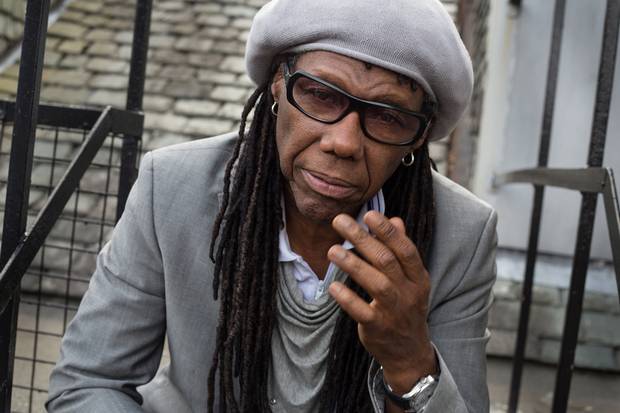Nile Rodgers jabs the idea approvingly with his finger, a toothy grin unveiling under those shades. He likes the theory that disco was the first mainstream musical genre to truly embrace diversity of race, sexuality and background.
“That’s exactly it,” he purrs. “Man… you’re right on the money. I was a jazz snob. I sort of looked down upon pop music. I played it all the time because I had to make a living but I felt it was beneath me because it was too simplistic. My girlfriend at the time worked in one of the most popular jazz clubs in New York but we just happened to go into a disco for a drink. I never saw anything as romantic and unifying. All these different types of people dancing to Donna Summers’ ‘Love To Love You Baby’. So sexy. So incredible.”
As someone responsible for helping kickstart millions of parties since 1977, Rodgers has earned the right, at 65, to be wistful. From the floor-filling canon of Chic to midwifing Madonna’s early steps on Like A Virgin, all the way through to the globe-conquering neo-boogie of Daft Punk’s ‘Get Lucky’, Rodgers has been there, done that, and made it a smash hit by virtue of his presence in the studio. To illustrate, in early January 1985, he had presided over each of the top three singles in the US charts (‘Like A Virgin’, Duran Duran’s ‘The Wild Boys’, and ‘Sea of Love’ by The Honeydrippers).
For him, the past is a place of studio breakthroughs, celebratory cork pops, and oceans of delighted smiles and dollar bills. He is able to reflect on the history of himself, his Midas touch and the hundreds of millions of sales that carry his moniker, with ease, simply because that history is still taking place.
“Another thing happened that I’ve only talked about once or twice in my life,” he breezily continues of that fateful night. “I have some form of synaesthesia because I always have music in my head. It drives my girlfriend crazy because I go home and have to turn the television on because I can’t sleep in a quiet environment. Right now, talking to you is the distraction from the composition going on in my head. When I went to that disco, it was the first time I heard continuous music just like the one in my head. I didn’t know how to explain it to my girlfriend. It was a miracle to me.”
You’d never mistake Rodgers for anything other than a showbiz deity and pop guru. Dreadlocks spill out over his shoulders from under his beret, and the thread from which his clothes are made seems spun from mirror balls themselves. He is that mix of self-congratulatory and beautifully mannered you tend to get with the mega-famous, while a steady rhythm of enthusiasm pulses off him, a possible side effect of the condition he speaks of.
Somewhere out of sight rests ‘The Hitmaker’, the trusty Stratocaster with which his trademark wickety-wackety “chucking” style gets the planet moving. “I just love doing it,” he says. “I really do love it. It’s weird too – when I’m on the road and sometimes my roadies take my guitar, I feel naked sometimes. I just want to play it in the middle of the night!”
Later this month, Chic, the band he formed with late musical foil Bernard Edwards that remains the first and last word in the disco dictionary, release their tenth LP and their first in 25 years. It’s About Time features the gamut of Rodger’s rolodex, everyone from Elton John to Janelle Monáe to Lady Gaga. The album will have a few functions to perform beyond introducing a new generation to the group and getting rumps moving. As the title suggests, it carries a loose thematic undercurrent of taking stock and getting on with things now that the time is right. And for Rodgers’ generation, time seems to advance particularly quickly these days.
“I’ve had cancer twice,” he winces. “I’ve flatlined eight times [he has claimed this happened in 1984 while on a coke and booze bender with actor Robert Downey Jr]. I’ve lost so many friends in the business. Reggie Lucas, Avicii… the list is ridiculous. Bowie and Prince in one year – that was a real shocker. The Michael [Jackson] thing sort of came out of nowhere but we were all a little suspicious. It’s incredible, especially since I was the most reckless of everybody. I got high more, drank more, drove fast cars, fast boats, all the crazy stuff.”
He’s fashioned a career as long as the river he shares a name with by “fixing stuff”, a skill formed during childhood when heroin addiction meant his bohemian interracial parents depended on their son to organise things at home in NYC. He speaks affectionately of them despite their flaws, and describes the last two and half years since he had to institutionalise his Alzheimer’s-beset mother as “the hardest of my life”.
The original plan for this record was to do a straight-up tribute to those who’d played some role in taking him from “a little kid sitting on the edge of my bed hoping one day to get a hit record” to “an amazing life” of performing to “kings, queens and presidents”. But it was Bowie’s death in particular that made Rodgers reassess this concept. Something didn’t feel right about having the message so “frontal” when Chic had always traded very successfully in double entendres (“Every song I’ve ever written has been nonfiction with fictional elements to tie the story together. Even if it’s something stupid, it’s real”).
“I think about [Bowie] a lot,” he says. “I’m doing a lot of work with the Bowie estate. We have such phenomenal stuff in the vaults. People don’t realise I did a lot of work with David – Let’s Dance, Black Tie White Noise, ‘Real Cool World’, the Laurie Anderson record (‘Shining Star’) and I also did ‘Dancing in the Street’ with him and Jagger.”
The story goes that Bowie played Rodgers a folky version of the track before Rodgers did what all great producers do and gave that sketch the boot in the backside it needed. “We had rented Queen’s studio (Mountain Studios in Montreux, Switzerland). I said to him, ‘Damn, it must be amazing to be white.’ He said, ‘What do you mean by that?’ I said, ‘Well, Jesus, the fact that you could write a song called ‘Let’s Dance’ and it doesn’t make people dance!”
He taps a triumphant rhythm on his knee as a gentle chuckle comes out in 4/4 time, the beat in his head unable to contain itself.
Nile Rodgers and Chic release ‘It’s About Time’ on September 28 through Virgin EMI
Source: ‘I have some form of synaesthesia. I always have music in my head’ – Independent.ie













